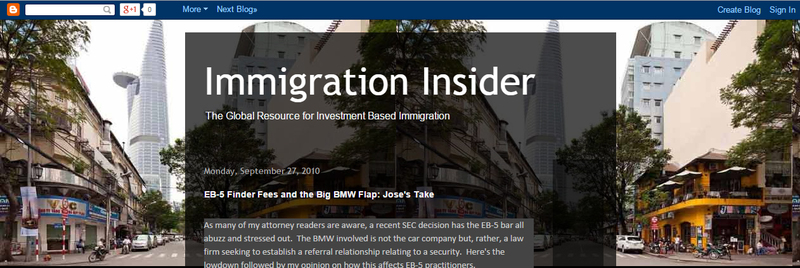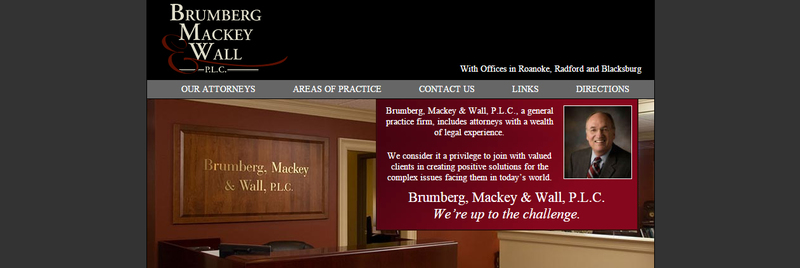
As many of my attorney readers are aware, a recent SEC decision has the EB-5 bar all abuzz and stressed out. The BMW involved is not the car company but, rather, a law firm seeking to establish a referral relationship relating to a security. Here's the lowdown followed by my opinion on how this affects EB-5 practitioners.
Under the arrangement they proposed to the SEC, the Brumberg, Mackey & Wall, P.L.C. (“BMW”) firm would not:
(1) engage in any negotiations with investors,
(2) provide potential investors any information about the energy company that could be used as the basis for funding-related negotiations,
(3) be responsible for, or make any recommendation regarding, the terms, conditions or provisions of any agreement for an investment or
(4) provide any assistance to any potential investor with respect to any transaction involving the financing of the energy company
The reason for this language was BMW's attempt to distinguish the earnings they would get from their activities as "finder's fees" vs. "commissions". Why? Because the SEC's cryptic regulatory language makes this distinction and a "finder's fee" does not require registration as a broker.

If you look at the enumerated "don'ts" above, it is clear that these would apply to an EB-5 referring attorney, but it goes beyond that: with an EB-5 Regional Center, there is no negotiating the terms of a Regional Center EB-5 visa opportunity; price, terms and conditions are defined in the PPM by the Regional Center. In the BMW decision,the SEC took issue that BMW did NOT state that they wouldn't have contact with potential investors as part of the proposed arrangement. In other words, despite the above enumerated list of what they would NOT do, the SEC took the absence of that latter statement as meaning that BMW COULD, conceivably, be involved in the investment process.
All of this begs the question: was, if any, other role was BMW playing in the contemplated transactions? This is the opening sentence on Martindale-Hubble describing BMW's main areas of practice:
Brumberg, Mackey & Wall, P.L.C. specializes in representing businesses and individuals in commercial, tax, estate, banking matters and real estate.
Based on what the firm does -- primarily transactional and commercial matters (although MH goes on to mention PI and other secondary areas of practice)-- , I believe the SEC reasonably expressed concern that BMW was likely to get involved with negotiations or other aspects of the contemplated transactions, which, unlike EB-5 RC offerings, are not carved in stone. Furthermore -- and I am speculating -- it is highly unlikely that fees earned via BMW's contemplated transactions were subject to outside conditions beyond BMW's control (e.g., USCIS petition adjudication). That element of the fulfillment of "conditions precedent" being satisfied before fees are disbursed, while not expressed in SEC regulatory language, goes a long way in making the common sense decision as to whether something is a "commission" vs. a finder's fee/bonus.
In their ruling, the SEC reasoned that the transaction-based compensation BMW sought to receive would give BMW a strong incentive to engage "pre-selling" or other sales activities such that BMW would need to register as a broker-dealer if it proceeded with the proposed arrangement…but I believe that this is because, in contrast to immigration counsel and EB-5 RC projects, BMW had no possible alternative role in the transaction except to broker it... the exact opposite of an immigration attorney working to secure an EB-5 RC based green card for his or her client.
Let’s draw some distinctions:
AN INDEPENDENT IMMIGRATION PROCUREMENT OBJECTIVE: Clients invest in EB-5 Regional Centers for the primary purpose of getting U.S. residency for themselves and their family. NO ONE invests in an EB-5 RC for yield, capital preservation, etc...all that are very secondary and tertiary considerations. An immigration attorney is involved in the EB-5 Regional Center visa process with one client and one purpose: to secure the U.S. permanent residency that client seeks through investment. In contrast to BMW, who is expressly there to identify prospective investors, the immigration attorney is putting the “cart before the horse”, as he or she SHOULD be, when he or she considers the underlying construction and elements of RC candidates identified by a client. Put simply, as I have long argued, the immigration attorney has, IMHO, an affirmative duty to conduct basic due diligence on any EB-5 Regional Center project he or she is prepared to present to any client. Instead, what we have seen is the proverbial ostrich game, where larger firms are so concerned about liability that they protect themselves by pretending that there is an artificial line between the immigration and investment objectives of an EB-5 visa; “Client, pick whatever RC you want, I’m just the visa guy”. TOTAL irresponsibility as I see it. Each immigration attorney who sends a client to a Regional Center in which he or she would never personally invest because they believe the I-526 will be approved but the investment is a bad one is every bit in violation of their ethical duties as an attorney who only cares about the referral fee and sends a client to a Regional Center where visa denial is likely. Yes, we are not investment advisers, but as immigration counsel we are bound to reasonable care, and it doesn’t take Gordon Gekko to see the obvious scams and failures which characterize the majority of the Regional Center projects being shopped overseas.
1- FEES ARE PAID AS A FINDER'S FEE/BONUS, NOT A COMMISSION: EB-5 Regional Centers – at least the vast majority – escrow both the capital investment and the syndication fee (from which the referral fees are paid) until the I-526 Investor Petition is approved by the USCIS. Accordingly, in contrast to a structure such as that advanced by BMWs argument, in the case of EB-5 visas, no approval…no immigration attorney referral fee. Now, most state bars prohibit contingency fees on family law and criminal law cases; I am unaware of any state bar which prohibits results-based bonuses relating to success in complex immigration filings.
2- EB-5 FINDERS FEES ARE NON-EXCLUSIVE AND WILL BE PAID BY WHICHEVER REGIONAL CENTER THE CLIENT ULTIMATELY CHOOSES: This may well be the simplest and most clear distinction to contrast BMW to our EB-5 situation. The referring attorney, unlike BMW, is not tied to any one project nor to any one Regional Center. If my client shows up and suggests RC's A, B, and C and I can look her in the eye and tell her that I see no fundamental flaws in any of them, I will get my finder's fee whether she picks A, B, or C. I am not BOUND to one client, hence the "hard sell" implicitly feared by the SEC in a client-specific situation such as BMW's does not apply. (That being said, as the immigration attorney, I DO have ethical violations to disclose the finder's fee I'll be receiving, to insure that I do not favor one RC over another based on a higher finder's fee offered and, most critical, to UNDERSTAND the immigration infrastructure and job creation methodologies, as well as all aspects of the project, so that I can protect a client from a fundamentally flawed EB-5 investment. )
ESCROWING ATTORNEYS FEES: THE ONLY WAY TO INSURE BOTH BAR AND SEC COMPLIANCE: As many of my readers know, I absolutely refused to filed I-526 Regional Center petitions for the last 16 years based upon my belief that one cannot serve both the Regional Center AND someone investing in them. After many clients complained that I was sending them to another attorney they didn't want and that they didn’t care if I got a referral fee provided their I-526 was approved, I finally figured out what I need to do to address my issues with this only this past June: just like the RC puts 100% of funds in trust until I-526 approval, I would put 100% of my I-526 attorneys fees in trust until I-526 approval. My clients pay the filing fees, costs, etc. when we file the I-526 but in the event of a denial, just as they would get their $500,000+ syndication fee back from the Regional Center’s escrow account, they would get 100% of the attorneys fees back from my trust account, which is completely permissible under bar rules as a immigration fee contingent upon approval and held in a Bar-sanctioned attorney funds account. (Obviously – and we are back to the Ostrich Syndrome – I’m only going to take cases from Regional Centers which I understand fully and believe to be valid permanent residency mechanisms for my clients…not any old Regional Center. That's why I only work with 3 RCs right now.)
I’m not a securities lawyers so I won’t get deeper into the 4 prong test, the Paul Anka decision (which required there to be zero contact between the finder and investor if a fee was permissible for someone not registered as a broker-agent, so it’s irrelevant since all immigration attorneys referring EB-5 prospective investors obviously know them), etc. But here's why I, for one, am not stressed out about the BMW decision:
- A performance-based incentive or bonus triggered by a favorable adjudication of an I-526 is not – and will never be – a brokerage commission. It is a finders fee contingent upon approval via a federal adjudication.
- I am authorized as an immigration attorney to receive a performance-based bonus as long as my client is aware of that bonus and agrees to it, and there is nothing regulatory of which I am aware which defines WHO may pay that bonus.
- Unlike the BMW firm, I am not obligated to a particular client nor selling an "investment"; I am advising the client on WHICH Regional Center is most likely to meet their immigration goals. Whether the client chooses A, B, or C, I am obligated to no Regional Center and - assuming I subscribe to the ethical self-checks described above -- will receive my finder's fee regardless of which center the client chooses.
It’s all about that one thing missing from so many in our profession, folks: good faith. The day I get into the “business” of headhunting for EB-5 investors, I’ll sit for my SEC license. Till then, I’m just an immigration attorney putting his money where his mouth is and, at least for now, the government is okay with that.
http://www.immigrationinsider.com/2010/09/eb-5-finder-fees-and-big-bmw-flap-jose.html
Mentions
- Jose Latour
- U.S. Citizenship and Immigration Services
- UNITED STATES SECURITIES AND EXCHANGE COMMISSION
States
- Virginia
Videos





Subscribe for News
Site Digest
Join Professionals on EB5Projects.com →
Securities Disclaimer
This website is for informational purposes only and does not constitute an offer or solicitation to sell shares or securities. Any such offer or solicitation will be made only by means of an investment's confidential Offering Memorandum and in accordance with the terms of all applicable securities and other laws. This website does not constitute or form part of, and should not be construed as, any offer for sale or subscription of, or any invitation to offer to buy or subscribe for, any securities, nor should it or any part of it form the basis of, or be relied on in any connection with, any contract or commitment whatsoever. EB5Projects.com LLC and its affiliates expressly disclaim any and all responsibility for any direct or consequential loss or damage of any kind whatsoever arising directly or indirectly from: (i) reliance on any information contained in the website, (ii) any error, omission or inaccuracy in any such information or (iii) any action resulting therefrom.


